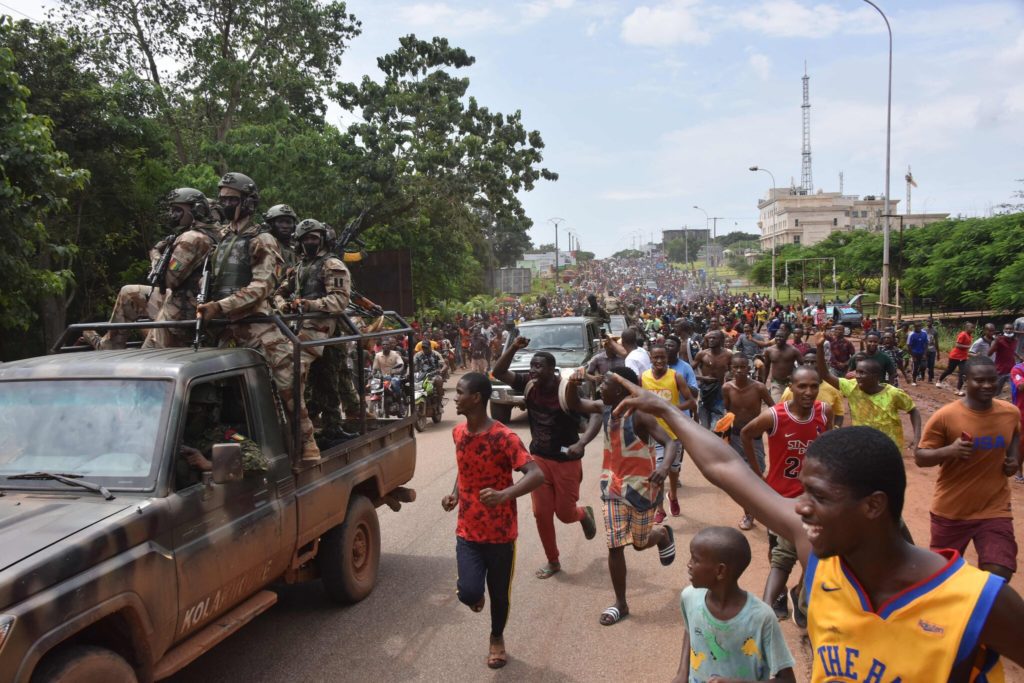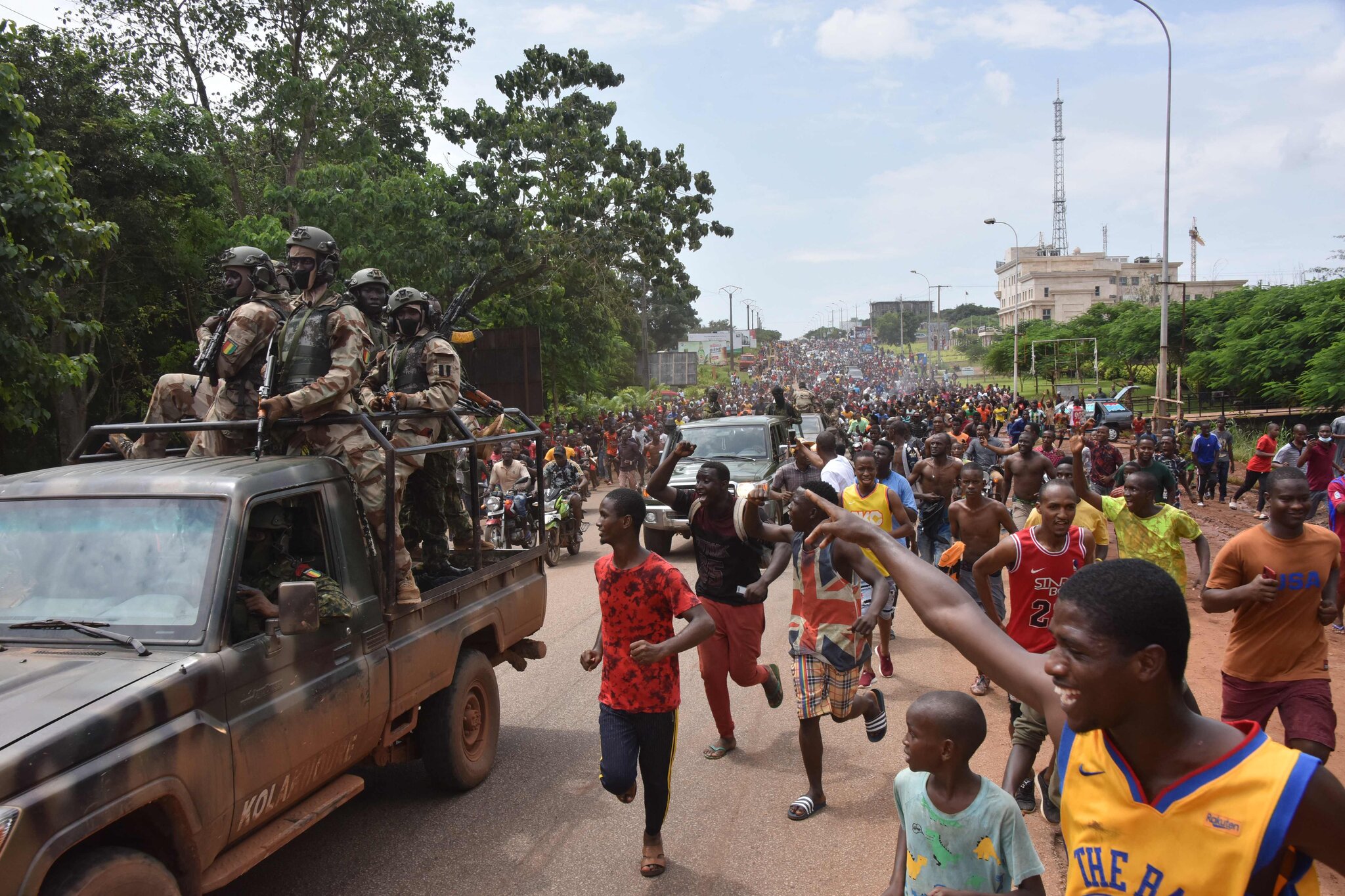 Cellou Binani/Agence France-Presse — Getty Image
Cellou Binani/Agence France-Presse — Getty Image People celebrating in the streets with members of Guinea’s armed forces on Sunday, after soldiers toppled Guinea’s president, Alpha Condé, in a coup d’etat in the capital, Conakry.
I’ve written about US news media coverage of the African continent over the course of many years. In my analysis of the coverage seen, the emphasis continues to be on what’s wrong with the continent, with little effort made to report progress made over many decades of African social, economic, and democratic change.
The coverage by American news organizations of the latest episode of a military coup in “Africa” or the African continent as I prefer to call it, confirms this amazing unprofessional practice.
Just like I pointed out in 2019 when the British Broadcasting Corporation(BBC) rushed to report about the coup in Sudan, the screaming headlines about a military coup in Guinea overshadowed other important Africa stories that deserved equal, if not, more attention.
Recently I made similar comparisons of this kind of profit-driven coverage when I wrote about Why Ethiopia’s Tigray Crisis Is Dominating Africa Headline News.
Since September 5 when it was announced that a Lieutenant Colonel, Mamadi Doumbouya, a special forces commander, had masterminded a coup that overthrew the government of President Alpha Conde in Guinea, coverage of the bloodless event by news media around the world has not stopped.
I examined 100 stories following the news and pondered why the story gained much prominence over other Africa stories in the same time period.
A contrasting situation is when there is little or no reporting for an equally important event, bearing international ramifications, that deserves global attention.
For this analysis, I looked at reporting from the following US media organs — Bloomberg News, The New York Times, Yahoo News, Reuters, Associated Press (AP), China Global Television (GGTV), CNBC, Cable News Network (CNN) International, Council on Foreign Relations, Foreign Policy, and Voice of America (VOA).
Yahoo News, for example, recycled or simply republished a lot of the stories on the Guinea situation from Agence France Presse (AFP), one of the three major so-called wire services.
China Global Television, while not a part of the cadre of Western media organs examined, provided a different kind of reporting on the same event. While the GCTV reports lacked depth, it’s reporting on the CGTV website was brief and lacked some of the character references to the military leaders, something that is common in reporting from US media outlets such as Yahoo News and Reuters.
There is also a notable difference in tone and language used by the different news organizations to explain what is taking place.
In their extensive reporting on the matter on the Aljazeera English website, writers refrained from the use of the same kind of descriptive language employed by media in the West. Rather, Aljazeera described the new leaders of Guinea simply as “coup-makers” or “military leaders.” The word ‘junta,” referring to the military regime rarely appeared in any of the analyses CGTV provided.
Foreign Policy, noted for its exceptionality, appears to lead with more thorough expert analysis. They did a better job overall in presenting what is taking place in Guinea. But this kind of work does not come by easily. While some media outside the US left out details about the international implications of the takeover, CNBC and Bloomberg focused on the impact that the flow of raw materials, bauxite and iron ore, which Guinea produces in abundance, would have on global markets.
Why Journalistic Proportionality Matters
The Guinea storyline bears a certain familiar backdrop.
What is known is that media around the world, including media in the United States, work on deadline. The same media, especially US local television stations and newspapers, oftentimes compete with each other against shrinking audiences and marginal profits. The scramble to be “first,” a slogan we often see in local reporting, prioritizes profits over thoroughness.
When it comes to Africa coverage, the proportion of time spent digging up its past far outweighs the amount of time spent projecting progress Africa has made over the last decade. And, yes, of course, the media has a responsibility to be fair-handed. And, unfortunately, a great number of African-owned media and community organizations in America, engage in the misrepresentation of the continent themselves.
But even more, coverage of other equally important Africa stories, such as this WHO report about a 23 percent drop in COVID-19 cases in Africa, is ignored by the majority of news media. While it’s now easy for anyone to publish the news, the idea of proportionality, an important tenet that belies fair journalistic scrutiny, takes the back seat.
In their book, The Elements of Journalism, Bill Kovack, and Tom Rosenstiel looked at proportionality from the lens of cartography. They tell us the concept of cartography helps explain completeness and proportionality, something that gives value to any work of journalism.
“Journalists who devote more time and space to a sensational trial or celebrity scandal than they know it deserves – because they think it will sell – are like the cartographers who drew England or Spain the size of Greenland because doing so was popular.”
This is what we see, all the time when US news organizations report the news about Africa. One of the results is what I call “re-cycled news” from and about the African continent. It’s gobbled-in, gobbled-out.

